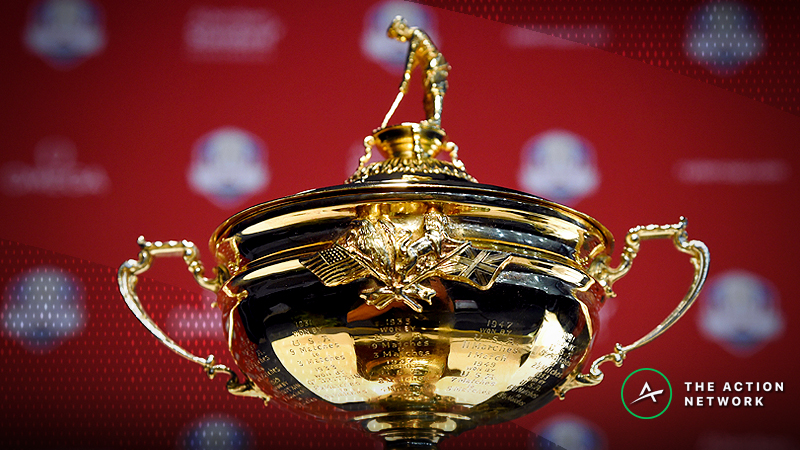2018 Ryder Cup: Fourball, Foursome and Scoring Info to Know
John David Mercer-USA TODAY Sports
- The 2018 Ryder Cup will begin on Friday, Sept. 28, at Le Golf National in Guyancourt, France.
- The format consists of three categories: foursome play, fourball play and match play. Read below for a detailed explanation of each.
- There are 28 available points, and the team with the most points at the end of Sunday wins the Ryder Cup.
The Ryder Cup consists of three different formats:
- Fourball
- Foursome
- Match play
Friday and Saturday consists of four fourball matches and four foursome matches. The home captain decides which format will be played in the morning round versus the afternoon.
Sunday, the third and final day, consists of 12 singles matches — each member of the U.S. team will face a member of the European team in a match-play format over 18 holes.
Scoring
Each match is worth a full point for a win or a half-point for a draw. The team with the most points — there are 28 available points — wins the Ryder Cup.
If there's a 14-14 tie, the previous Ryder Cup winner (in this case, the U.S.) retains the cup for the next two years.
Here's how the points will be allocated:
Friday a.m.: 4 fourball or foursome matches — 4 points available
Friday p.m.: 4 fourball or foursome matches — 4 points available
Saturday a.m.: 4 fourball or foursome matches — 4 points available
Saturday p.m.: 4 fourball or foursome matches — 4 points available
Sunday: 12 singles matches — 12 points available
Below is a quick guide to how each format works.
Fourball
In fourball, or "better ball," teammates will play their own ball through the entire hole. The lowest score among those two players is counted for their team.
For example, let's say Patrick Reed and Jordan Spieth play Rory McIlroy and Thorbjorn Olesen. On Hole 1, here are their scores:
- Reed: 4
- Spieth: 3
- McIlroy: 4
- Olesen: 5
The U.S. team would count Spieth's score of 3 versus McIlroy's score of 4, going up by one on that hole. Whichever team wins the most holes at the end of the round wins 1 point toward the Ryder Cup scoring; a draw means both teams get a half-point.
This format sets up well for the U.S. team, which features some of the longest drivers and best birdie-makers in the world.
One player can play aggressively on a hole to put up a low score while his teammate takes a conservative route to ensure a par. This is a great format for guys like Dustin Johnson Justin Thomas and Tony Finau, who can rip driver on as many holes as possible.
Foursome
Foursome play, or "alternate shot," is exactly how it sounds.
Teammates alternate each shot, and players cannot tee off on two consecutive holes.
Using our players above again, if Spieth tees off on Hole 1 and hits it into the fairway, Reed will then have to hit the second shot from the fairway. Let's say Reed hits the green; then Spieth will take the first putt. On the following hole, Reed will tee off and they'll continue to alternate.
Whichever team wins the most holes at the end of the round wins 1 point toward the Ryder Cup scoring; a draw means both teams get a half-point.
This format rewards ball-strikers and consistent players.
If a player misses the fairway off the tee, his partner will have to deal with a difficult second shot. This likely favors the European team, which boasts some of the best ball-strikers and consistent players in the world such as Paul Casey, Justin Rose and Tommy Fleetwood.
Match Play
This is the format with which most fans are most familiar. One U.S. team member will face a European team member over 18 holes. Whoever wins the most holes at the end of the round wins a point for his team. A draw awards a half-point to both teams.
How would you rate this article?




